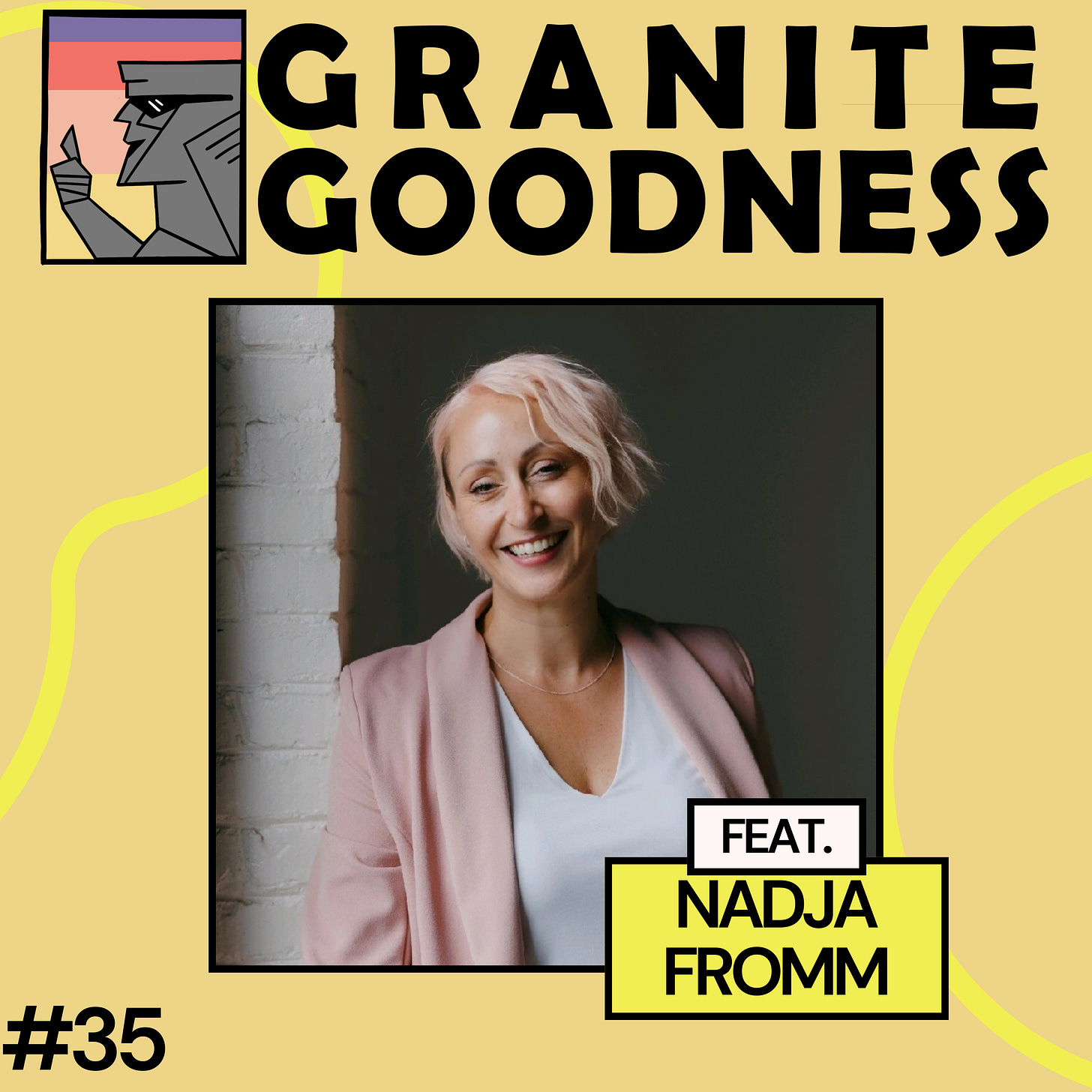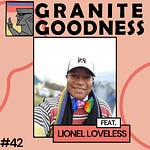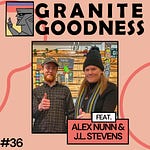*This episode contains swear words*
On episode 35 of Granite Goodness, Andy talks to Nadja Fromm. The two discuss:
Nadja’s journey from Germany to NH: Nadja moved to New Hampshire for a job with Lindt and stayed, loving the community.
Corporate Burnout: Years of success led to burnout, pushing her to reassess her life.
Healing Journey: Therapy and coaching helped Nadja overcome limiting beliefs and embrace balance.
Entrepreneurial Pivot: She left corporate life to help others build fulfilling, sustainable careers.
Empowerment Focus: Nadja encourages authenticity, self-worth, and women taking up space in business.
and more!
Nadja Fromm is the founder of Fromm Consulting where she utilises her 20 years in the business world to help entrepreneurs turn their ideas into reality.
Links & Notes:
This episode was recorded in Treeline Outfitters in Portsmouth, NH
Music provided by Sneaky Miles
Youtube
AI Generated Episode Summary*
Can you tell us a bit about your journey to the U.S.? What brought you here?
Sure! I started my career in Germany, working in advertising agencies, startups, and corporate roles, climbing the ladder. Eventually, I founded Fromm Consulting in 2014, helping startups grow. Then one day, Lindt offered me a job in the U.S. I had just gone through a breakup, and I said, "Sure, why not?" Two months later, I landed in Stratham, New Hampshire, with no idea where I was going or what New Hampshire was. I thought I’d stay for two years, but here I am, seven years later, and I love it.
What was it like building a company for Kraft Heinz? That sounds huge.
It was an incredible experience. Kraft Heinz hired me to launch a spice company they’d just acquired—a German startup called Just Spices. I was employee number one in the U.S. I had to set up everything: logistics, manufacturing, retail, and the website. I didn’t even know how to cook, but I built it from the ground up. It reminded me how much I love creating something from scratch. That said, it also burned me out.
Burnout seems like a recurring theme. What happened, and how did you recover?
Yes, I’ve burned out three times in my life. The first time, I ended up in a mental hospital and was fired. The second time, I pushed through it because I “didn’t have time to burn out.” This third time, everything fell apart: my marriage, my job, my sense of self-worth. It was like a train wreck going into a burning dumpster fire. My body shut down completely—I couldn’t get out of bed. That’s when I realized I needed help.
How did you start rebuilding after such a low point?
I was lucky to have support from people like my old CEO in Germany. She connected me with a leadership coach who’s also a shaman and Reiki master. I flew to Germany, and we did deep trauma work—addressing beliefs like “I’m not enough” or “I’ll die alone.” That was the breakthrough I needed. From there, I started working with therapists and a holistic business coach to reconnect with myself and redefine success.
You mentioned struggling with corporate environments. What pushed you to start your own business again?
In corporate life, you’re often just a number—an expense line on a budget. If you stumble or aren’t performing, you can feel discarded. I couldn’t find an environment where I was valued as my full self—flaws and all—so I created it. Now, my mission is to help others break away from that cycle. I want people to build careers that are fulfilling, stable, and true to their souls.
How does culture play into business? Do you see differences between Germany and the U.S.?
There are similarities, like the drive for success and the hustle culture, but there are big differences too. In Germany, people don’t strike up conversations with strangers like they do here. Americans are much more open and friendly, especially in New Hampshire. That openness is refreshing. That said, the pressure to perform exists everywhere.
You talked about learning to balance masculine and feminine energies. What does that mean to you?
Growing up, especially in corporate culture, I thought I had to mimic “masculine” traits to succeed—being aggressive, tough, unemotional. I’d even Botox my face so no one could read my emotions! I’ve since learned that being soft, empathetic, and vulnerable isn’t a weakness; it’s a strength. We all have masculine and feminine energies, regardless of gender, and embracing both makes us better leaders and humans.
You also spoke about how women are treated in professional spaces. What’s your advice?
Women often make themselves “small” in meetings—physically or emotionally—because we’re socialized to accommodate others. One tip I give is to take up space: don’t shrink yourself. For example, if you’re sitting in a room, claim the chair next to you, lean in, make yourself visible. Assertiveness is leadership, not “bossiness.”
So after everything, how do you define success for yourself now?
Success for me now isn’t just about titles, salaries, or pleasing others. It’s about feeling fulfilled and connected to what I do. I’m learning to say, “I am enough,” and celebrate what I’ve achieved without constantly chasing perfection. It’s also about helping others build lives they love—ones where they can hustle but still feel whole.
What would you say to someone struggling to balance work, life, and purpose?
I’d tell them they aren’t alone. Sometimes, you have to hit pause and really ask yourself, “What do I want?” That’s hard work, and it might require therapy, coaching, or deep introspection. But it’s worth it. Life isn’t about surviving; it’s about thriving. Define your own path, embrace the messy parts, and don’t be afraid to create something new.
*This episode summary was generated by an AI analyzing a transcript of the interview. The questions, wording, and written meaning of particular sections may contain slight differences to the original conversation. We include these summaries to give listeners a brief, readable synopsis of the episode. The full episode transcript is available on granitegoodness.com.














Share this post